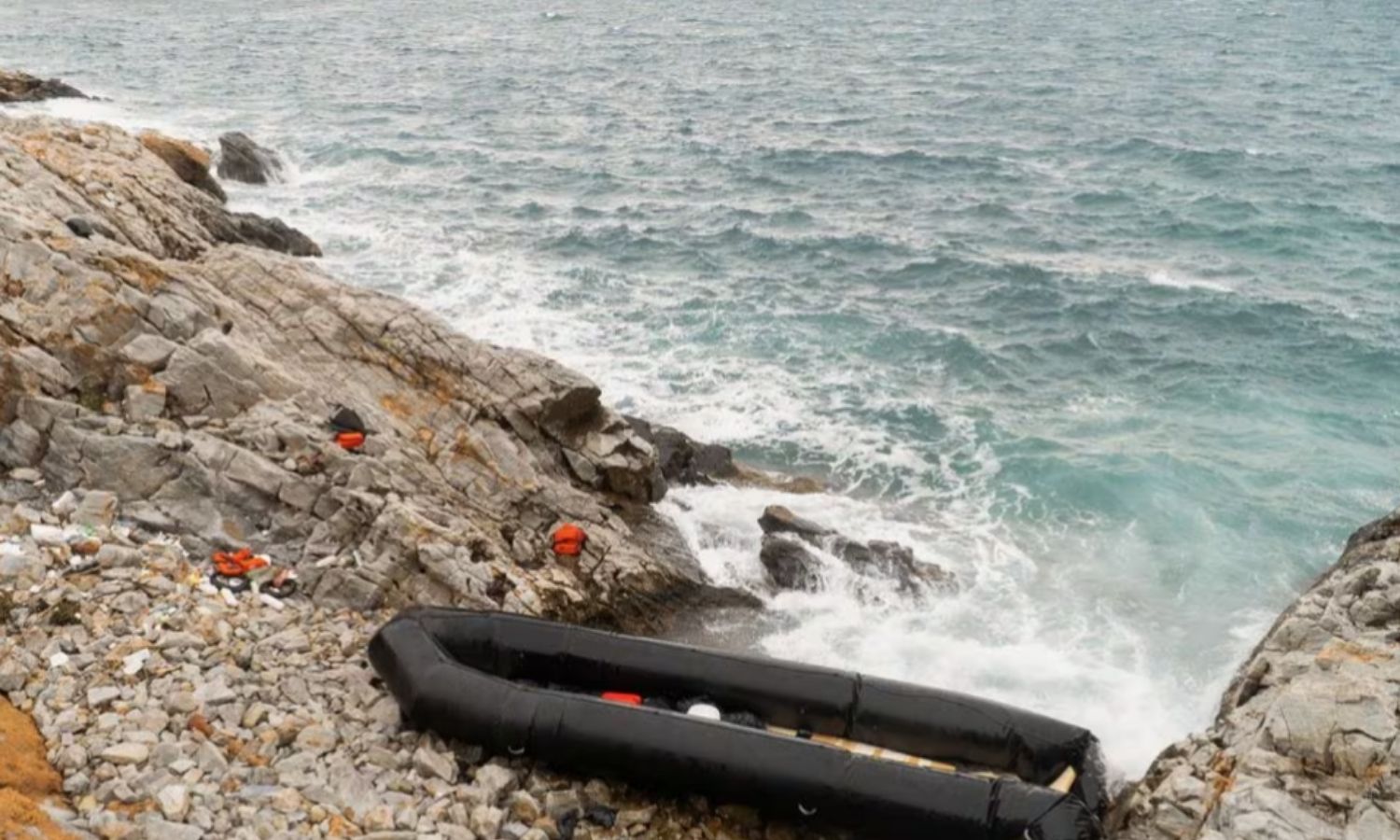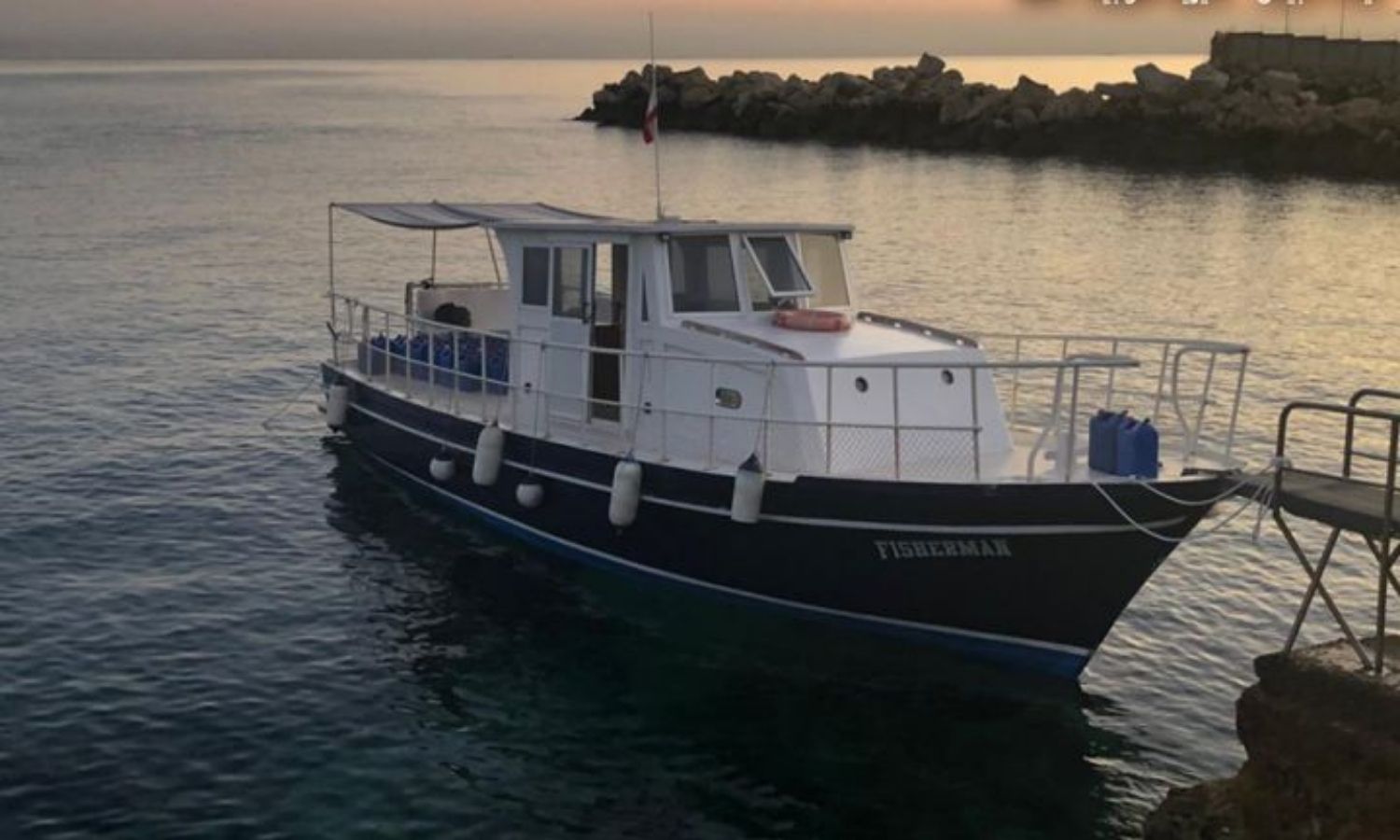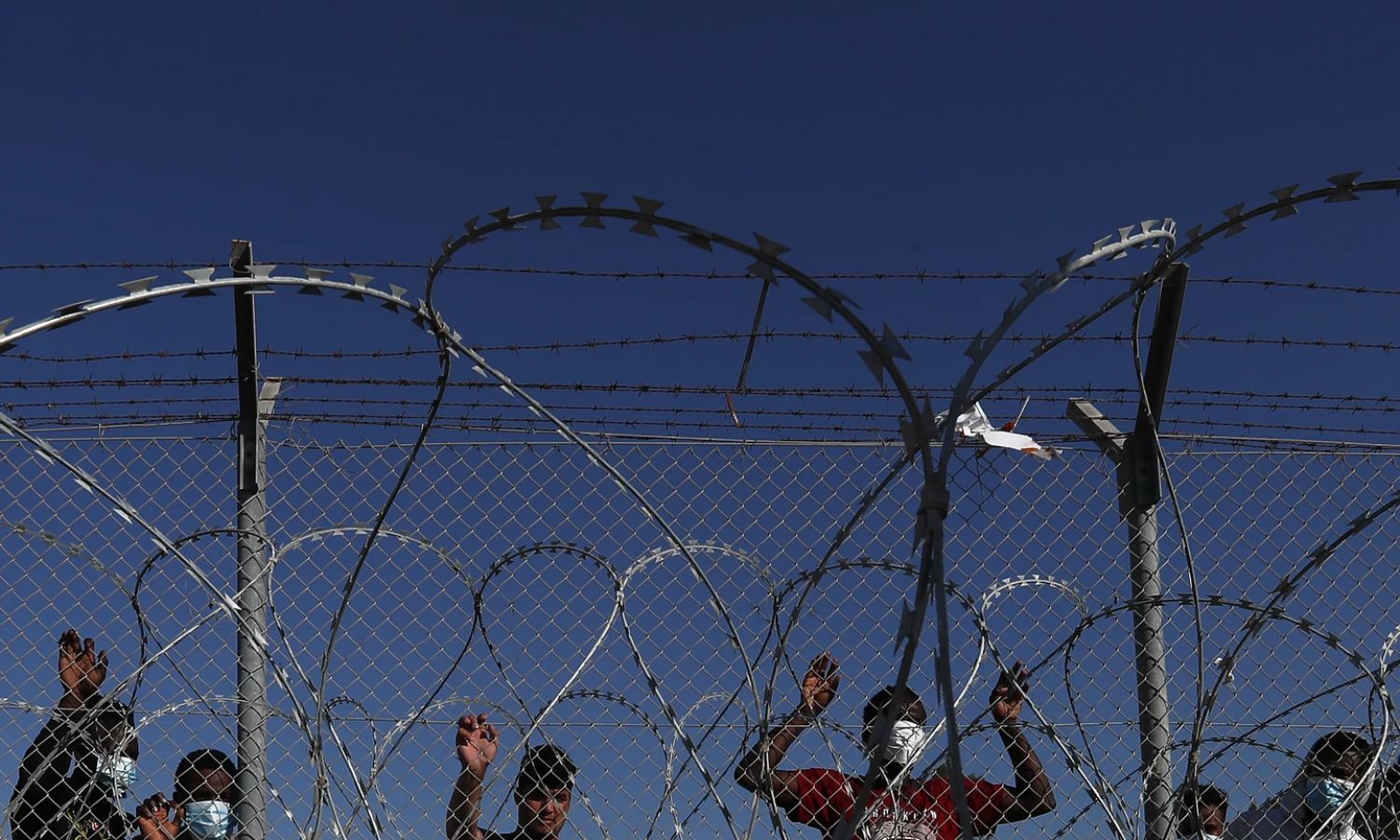



“The fear in my heart was like that of someone expecting death at any moment,” describes Mohammed al-Dameri his feelings of fear and terror of the sea and drowning, which formed the greatest anxieties of his journey that lasted about ten days at sea, stretching from the beaches of Tripoli in Lebanon to Cyprus.
Al-Dameri rejected the idea of sea migration with his wife and four-year-old daughter several times, knowing the dangers of the journey and the possibility of drowning, but the poor living conditions and the pursuit to improve the future of the family forced him to make the decision after continuous communication with friends who had experienced migration to Europe in the previous period.
Syrians residing in areas under the control of the Syrian regime migrate to Europe via several routes, but their choice of Lebanon as the first destination to leave Syrian territories has become noticeable lately, leading to official statements from the Cypriot government talking about being on alert after receiving information about hundreds of Syrian refugees on the Lebanese coasts, as happened in late October 2023, where migrants then continue their journey from Lebanon towards Greek Cyprus and onto other European countries.
Enab Baladi, through communication with individuals who have experienced this and a Syrian smuggler who has been involved in these operations for two years, discusses the routes taken by the Syrians during the trip, the procedures followed by the smugglers inside Syria and Lebanon, and the steps taken to gather the migrants.
There are two options for migrating from Syrian territories to Lebanon, either via Hermel or the Wadi Khaled route, with prices varying according to the different methods of crossing and the duration.
The Wadi Khaled route is used by smugglers to arrange migration operations, with the end of the al-Qusayr city in the Homs governorate being the starting point for both routes; from al-Qusayr to the Wadi Khaled area in the Akkar governorate in Lebanon takes about eight hours, five of them walking on foot, and three in cars transporting them to Wadi Khaled, to organize the smuggling and migration to Cyprus. An individual pays $70 US dollars for this route, according to testimonies obtained by Enab Baladi.
As for the Hermel route, it is about 25 kilometers away from the Syrian city of al-Qusayr and costs more, up to $130 US dollars per person, due to the ease of crossing through smuggling vehicles.
Mohammed al-Dameri, a son of the Shaghour district in Damascus, told Enab Baladi that he chose to cross via the Wadi Khaled route despite its difficulty and that the crossing journey took about a full day until his arrival, followed by going to Beirut and staying at a friend’s house until his departure.
Al-Dameri told Enab Baladi that he sold the carpentry workshop he owned to cover the cost of the migration, amounting to about $6,000 US dollars for him and his wife, not including his daughter.
Al-Dameri’s experience is not unique, as Noor al-Shattar, a woman from the city of Sanamayn in northern Daraa countryside, chose migration to Europe with her two daughters via the Hermel route after searching and inquiring, because of the hardships she heard about the other route and the risks of being shot at by Lebanese security, as she told Enab Baladi.
Al-Shattar (55 years old) agreed with a smuggler named “Abu Ali” via the WhatsApp application on the cost and starting point, which he set under the al-Zahirah bridge in the Syrian capital Damascus, assuring her that he would depart if she was late.
Regarding the vehicle waiting for her, al-Shattar told Enab Baladi it was a tinted van with black windows, inside of which sat 16 young men and women, crammed into a tight space despite not carrying more than a small backpack each.
During the transfer to al-Qusayr in Homs, one of the youths filmed the car’s plate and sent it to his brother. The driver, known as “Abu Hassan,” saw it and called someone, addressing him as sir, revealing to the passengers that he (the driver) worked for an officer in the Syrian regime’s army, according to al-Shattar.
She continued her story, saying that upon arrival at the city of al-Qusayr in the southern countryside of Homs, the first checkpoint among the six checkpoints in the city stopped them. A conversation between the driver and the officer clarified that he was aware of the ongoing smuggling operations in the area, as he allowed them to cross without stopping or searching at the remaining checkpoints in al-Qusayr.
After bypassing the last checkpoint between al-Qusayr in Syria and the city of Hermel in Lebanon, the car crossed a Lebanese checkpoint adorned with pictures of Hassan Nasrallah, Secretary-General of the Lebanese Hezbollah, to unload the passengers at a house after the checkpoint, only about 300 meters from the Lebanese border.
Upon reaching Lebanese territory, migrants are distributed in houses designated to begin specific procedures followed by the smugglers and their companions, according to the individuals with whom Enab Baladi spoke while preparing the report.
Noor al-Shattar says that after being led to the designated house, which contained a woman and six young men carrying rifles and wearing regular clothes, they were placed in a room adjacent to another housing women from the Hama countryside.
Al-Shattar mentioned that the young men began to record the full names of all the passengers and also inquired about their desire to move to Tripoli or Beirut, leading to Noor al-Shattar, along with her two young daughters (27 and 22 years old), being transported by car to an area with a bridge and a barrier of wires that separates the Syrian-Lebanese border, which they had to cross by foot before the arrival of a Lebanese army patrol.
Migrants are transported by vehicles belonging to Lebanese smugglers through the alleys and streets of Hermel city to Tripoli to avoid exposure to security patrols as much as possible, according to al-Shattar.
The migrants are handed over official stamped papers, stating that they have left Syria and will not return, endorsed by the UN, and al-Shattar does not know if this paper is legitimate or forged. They also receive red-colored papers, stating that the bearer is trying to renew their stay in Lebanon, according to what was explained to al-Shattar, who was forced to repeat this at every security checkpoint they encountered on the way to Tripoli.
According to information that reached Enab Baladi, migrants are requested to hand over their identity documents, including personal IDs and others, along with mobile phones, being allowed to keep only one phone on the boat during the trip to Cyprus.
“The smuggler, named Abu Mohammed, did not send my identity documents and mobile phones to my friend despite contacting him under the pretext that the documents were lost, but I discovered that the migrants’ documents were completely burned.”
Mohammed al-Dameri – Syrian Migrant
After arriving in Beirut, Mohammed al-Dameri contacted a Lebanese smuggler who resides in Tripoli named Abu Muhammad; he got his phone number from a friend who lives in Idlib city and coordinates smuggling to Cyprus, without mentioning his name.
Al-Dameri agreed with the smuggler to pay $2,800 per person and stipulated not to carry luggage with them, as the boat would carry only 15 passengers. Al-Dameri and his family moved to the specified address in Tripoli, where a car belonging to the group picked them up and took them to a house that had gathered 13 people of Syrian nationality, who would migrate together to Cyprus.
Describing the journey while explaining the details to Enab Baladi, al-Dameri called it “waiting for death” due to the moments of fear he experienced during the days of travel, as his fear for his wife and daughter exceeded his fear for himself.
The prayers of an elderly man and his recitation of verses from the Holy Quran during the trip amid the worsening waves that struck the boat, mixed with al-Dameri’s constant fear due to the man’s attempted suicide at one point, and the vomiting of one of the women due to seasickness, which made the scene more difficult and weakened his ability to endure, according to what he told Enab Baladi.
As for Noor al-Shattar’s journey, it was postponed for a week after her arrival in Tripoli, which forced her to stay with acquaintances until the smuggler responsible, called Bassam Abdullah, determined a date for the trip, she claimed. Then, a van came to transfer them to a house that included 30 people, including children and men who would migrate on the same trip.
Al-Shattar’s journey was no less dangerous and frightening, and the situation worsened as their boat was stopped by the Cypriot authorities, who originally intended not to allow them to disembark. They waited about 13 hours to get permission from the Cypriot authorities to enter after being ordered to return to Lebanon upon their stop. However, after the pleas from the women and children, they were allowed to cross to Cyprus, with the refusal to let the young men on the trip enter, who were ordered to return to Lebanon.
Muhammad, a Syrian smuggler working in Lebanon for about two years, told Enab Baladi that those who work in smuggling must have connections in several areas. Their work requires precision and caution, and connections with Lebanese security and the Syrian army collectively.
Muhammad (Enab Baladi did not disclose his full name for security reasons) continued that he communicates with many individuals and Syrian families that decide to migrate to Cyprus from Lebanon by sea, establishing contact through special numbers on the WhatsApp application, without disclosing the true names of the smugglers.

A boat used for human smuggling was caught by the Lebanese army in the Qalamoun area of Tripoli district – July 2022 (Official Website of the Lebanese Army)
The journey starts from the beaches of Tripoli facing the Syrian shores, where the boat sails for about ten kilometers within Syrian waters before entering international waters towards Cyprus.
The smuggler Muhammad told Enab Baladi that smuggling operations are carried out with coordination between individuals from the Lebanese army or security and the Fourth Brigade of the Syrian army.
Out of every three or four trips, one is caught, either before sailing or at sea, by the coast guards, and those caught are handed over to the Fourth Brigade in Syria. The Lebanese army informs the smugglers, who then communicate with an officer called “Safer Abu Jahash,” a Lebanese who controls the Wadi Khaled area and deals with the Fourth Brigade to exchange migrants for a fee of $350 per person.
The sums of money captured are shared between the Fourth Brigade and the Lebanese army. That is why some smugglers ask for a fee of $3,400 per person, so they do not have to pay extra charges from their share.
The prices for smuggling across the sea depend on age. Infants are not charged, while for children aged one to eight years, the fee for two children is equal to that of one passenger, and anyone over eight years old is charged $2,900.
After gathering the individuals in houses designated for assembling the migrants, all documents proving that they are residents in Lebanon or have entered Lebanon are taken from them. They are allowed to keep one mobile phone for all passengers of the trip and then are transported by cars to the beaches of Tripoli and put in the prepared boats.
Muhammad told Enab Baladi about the types of boats used during the trips, stating that there are two types. The first is a wooden felucca boat, ranging from eight to fourteen meters long, carrying about 50 passengers, and the second is a thick small boat, seven meters long, capable of transporting 16 passengers.
Data issued by the Aliens and Immigration Service of the Cypriot police showed that Syrians who arrived in Cyprus in 2022 constituted 23% of the total asylum seekers, while this percentage reached 53% by mid-November 2023.

Asylum seekers stand behind a fence inside a refugee camp in the Kokkinotrimithia area outside the Cypriot capital of Nicosia – February 5, 2021 (AP)
The Cypriot newspaper, Philenews, reported this data, stating that one in every three asylum seekers who reached Cyprus “illegally” holds Syrian nationality in 2023, compared to one in every four in 2022.
Cyprus returned more than 100 Syrian asylum seekers after catching them on its territory to Lebanon, where most of them were deported to Syria after being investigated by the Lebanese army, according to the United Nations.
The United Nations Refugee Agency expressed “grave concern” on August 11, 2023, to the Associated Press at the time, about the deportation of more than 100 Syrians from Cyprus to Lebanon, without assessing whether they needed legal protection or whether repatriating them posed a danger.
Enab Baladi’s correspondent in Daraa, Sarah al-Ahmad, contributed to this report.
if you think the article contain wrong information or you have additional details Send Correction